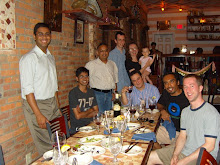Below is the abstact from the article “Increased Gray Matter Density in the Parietal Cortex of Mathematicians: A Voxel-Based Morphometry Study” by K. Aydin, A. Ucar, K.K. Oguz, O.O. Okur, A. Agayev, Z. Unal, S. Yilmaz, and C. Ozturk published in the American Journal of NeuroRadiology (AJNR), Nov-Dec 2007:
BACKGROUND AND PURPOSE:
The training to acquire or practicing to perform a skill, which may lead to structural changes in the brain, is called experience-dependent structural plasticity. The main purpose of this cross-sectional study was to investigate the presence of experience-dependent structural plasticity in mathematicians’ brains, which may develop after long-term practice of mathematic thinking.
MATERIALS AND METHODS:
Twenty-six volunteer mathematicians, who have been working as academicians, were enrolled in the study. We applied an optimized method of voxel-based morphometry in the mathematicians and the age- and sex-matched control subjects. We assessed the gray and white matter density differences in mathematicians and the control subjects. Moreover, the correlation between the cortical density and the time spent as an academician was investigated.
RESULTS:
We found that cortical gray matter density in the left inferior frontal and bilateral inferior parietal lobules of the mathematicians were significantly increased compared with the control subjects. Furthermore, increase in gray matter density in the right inferior parietal lobule of the mathematicians was strongly correlated with the time spent as an academician (r = 0.84; P < .01). Left-inferior frontal and bilateral parietal regions are involved in arithmetic processing. Inferior parietal regions are also involved in high-level mathematic thinking, which requires visuospatial imagery, such as mental creation and manipulation of 3D objects.
CONCLUSION:
The voxel-based morphometric analysis of mathematicians’ brains revealed increased gray matter density in the cortical regions related to mathematic thinking. The correlation between cortical density increase and the time spent as an academician suggests experience-dependent
structural plasticity in mathematicians’ brains.



